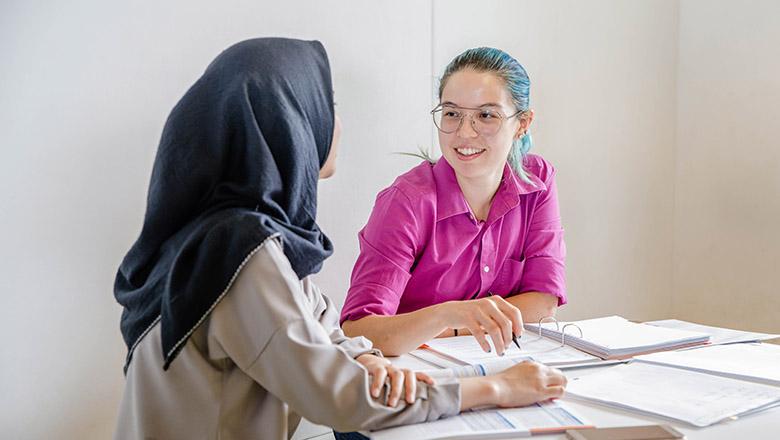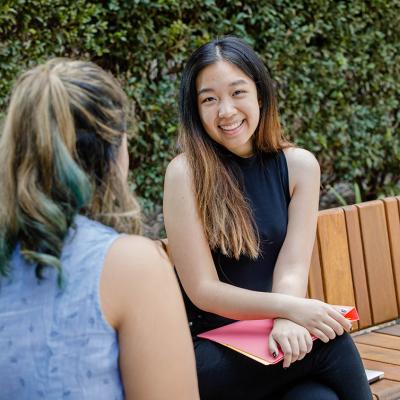What are good study habits for high school students? Moreover, what's the importance of good habits for students in general, and how can parents instil these in teens early on?
The adolescent years are a time when young people establish independence and take on more responsibilities, but teens still need guidance to help them become the best versions of themselves. And this means establishing healthy habits – whether they relate to study or developing interpersonal skills – that will benefit them through every stage of life.
Here are some beneficial habits you can help your teen start developing now. These good habits will not only assist with improving study skills for high school, but will also enhance your child's personal development as they move into adulthood.
Good study habits for teenagers

How many times have you caught your teen filming a TikTok video or scrolling through their Snapchat feed when they were meant to be studying? It’s tricky to stay focused on schoolwork when there are so many distractions readily available in the palm of their hand. Even so, it’s important for high school students to establish good study habits that will benefit them throughout their working life.
Phones aren’t always the enemy. Check out these handy study apps to help your teen stay on track with their schoolwork.
Encouraging good study habits for your teenager won’t just help them get better grades, either. There are many other potential benefits including:
- developing their confidence and competence
- reducing their anxiety around taking exams or assignment deadlines
- improving their ability to retain information
- freeing up more time for the things they enjoy doing.
Most successful students achieve their accomplishments by applying their strong studying mindset to everything they tackle. If your teen gets discouraged, be there to remind them not to give up and keep practising until their good study habits feel like second nature.
How to develop good study habits in high school
The key to developing good study habits starts with consistency. If your teen wants to know how to improve study habits in high school, there are plenty of ways they can go about cultivating them:
- Take meaningful breaks from social media. Tell your teen to switch off their phone, close the apps and to log out from social media browsers on the laptop. Notifications are an easy way to lose track and deter them from starting or finishing a task.
- Set up a study area. Help your teen create a peaceful zone inside the house where they can focus on the tasks at hand. It should be quiet, comfortable and uncluttered with minimal distractions. Nowhere suitable at home? Check out the library in your local area.
- Don’t cram. Encourage your teen to avoid attempting to jam all their study into one night. Cramming can increase stress and make it more difficult to retain information. By establishing a routine and study schedule, they’ll make more effective use of their time.
- Outline objectives. To ensure your teen accomplishes what they need to in a practical, systematic fashion, it’s a good idea for them to identify their daily and weekly goals. They might even want to loosely plan out the term if they know when assessments are due. This will help them learn to prioritise and break up bigger tasks to tackle them in a manageable fashion.
Time management

Strong time management skills go together with good study habits. Whether your teen likes to wait to the last possible moment to complete their science lab project or they continually miscalculate how long it takes them to get ready for soccer practice, waiting until the last moment to complete tasks or arrive to an event will cause them issues in their adult life. Future university professors and bosses won’t be so lenient with tardiness.
Instil in your teen the importance of managing their time effectively on their own without needing constant reminders. If this is a skill that’s new to them, it might take some time for them to polish it. Encourage them to write down their schedule and prioritise activities based on what they have on.
Regular sleep routine
Teens are notorious for having an unpredictable sleeping schedule. With the combination of early school starts, social media and Netflix binges, it’s no surprise they might not be getting enough Z’s each night. It’s recommended by national standards from the Australian Department of Health for teens to get 8-10 hours of sleep per night, so it’s not a bad idea to help them establish a regular sleep routine to allow them to function at school to the best of their ability.
Find out more about how much sleep teens need vs. how much they actually get.
Proactive and courteous communication
Teaching teenagers effective communication skills isn’t always an easy feat, especially when conversing happens so often through technology. Teens are now more used to texting their friends over the phone than having those deep conversations face-to-face.
Growing up in the digital age means there’s less and less opportunities for kids to practise their verbal communication skills. But as parents, it’s your job to continue to provide them with chances to develop a proactive and courteous communication style. This can be fostered in several ways including:
- model active listening
- practise conversations at home
- educate on empathy and active listening
- instil respectful vocabulary
- establish courteous speaking and listening procedures
- teach non-verbal cues.
Don’t forget: the most powerful way to teach your teen how to have open and honest conversations is to lead by example.
Discover more good study habits for teenagers in our Student Support study skills resource hub.





